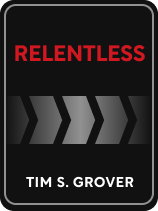

This article is an excerpt from the Shortform book guide to "Relentless" by Tim Grover. Shortform has the world's best summaries and analyses of books you should be reading.
Like this article? Sign up for a free trial here .
What is Tim Grover’s book Relentless about? How does Grover feel you can become the best version of yourself?
In his Relentless book, Tim Grover has three core ideas he discusses: a relentlessness definition, why the Unstoppable need to succeed, and how the Unstoppable direct their instincts. In addition, he offers key advice at the end on knowing when to call it quits.
Continue reading for our overview of the basic ideas in Relentless by Tim Grover.
What Is Relentless About?
In the book Relentless, Tim Grover explains the qualities you’ll need to become the best in your field—qualities that he collectively calls “relentlessness.” In this guide, we’ll first define relentlessness. Then, we’ll explore the two main qualities Grover argues are essential to relentlessness:
- The need to succeed: constantly pushing yourself as hard as you can to succeed by any means necessary
- Directed instincts: training yourself to use your animal instincts constructively in your field
Here’s an overview of Relentless by Tim Grover.
Part 1: Defining Relentlessness
Grover defines “relentlessness” as a state of mind in which you’re fully dedicated to becoming stronger, surviving, and overcoming obstacles to achieve your goals. Being relentless, Grover asserts, is how you can become the best at what you do and succeed time and time again.
(Shortform note: In some ways, relentlessness is similar to what psychologists call “conscientiousness” or the ability to make and work towards goals consistently while delaying gratification and overcoming obstacles. However, there’s one major difference between relentlessness and conscientiousness: While conscientious people plan ahead to avoid impulsive behavior, relentless people rely on impulsive behavior to help them succeed. Grover explains that anyone can be relentless in pursuing any task or discipline—relationships, your job, an art form, and so on. This is because relentlessness isn’t about what you do, but about how you approach what you do. In addition, he says that anyone can be relentless because relentlessness is natural and instinctual. All animals, even humans, are born with an instinctual drive to overcome obstacles and survive—in other words, we’re born relentless.
Part 2: The Unstoppable Need to Succeed
Now that we understand what relentlessness is and what can hold you back from it, we’ll look at those who are consistently relentless: the Unstoppable. In the rest of Tim Grover’s book Relentless, he discusses the two main qualities you need to be Unstoppable: the need to succeed and the ability to direct your instincts. We’ll start by defining the need to succeed through three different principles that support this quality:
- Never stop improving
- Put intense pressure on yourself
- Use any means necessary
Principle #1: Never Stop Improving
Grover says that constantly seeking improvement is a crucial part of doing everything you can to achieve your goals and therefore is crucial for acting relentlessly. In addition, by constantly pushing as hard as you can to improve, you’ll better understand what you’re capable of and how you can use those capabilities to succeed.
(Shortform note: Psychology suggests that constantly pushing yourself hard, as Grover encourages, can lead to burnout—a kind of emotional exhaustion characterized by disinterest and cynicism in regards to your field. The risk of burnout suggests that there are moments when not pushing yourself will actually better enable you to succeed in the long run, since it’ll make you healthier and keep you motivated to succeed. To avoid burnout while still pushing hard, experts recommend you learn to recognize when you’re pushing yourself out of habit versus when you’re doing it for a worthy goal. Ease off if you’re acting habitually, and keep going if you have a good reason to do so.)
Principle #2: Put Intense Pressure on Yourself
Grover’s second principle for developing the Unstoppable need to succeed is constantly putting intense pressure on yourself. Grover agrees with the commonly observed phenomenon that people perform better under pressure, and that being under pressure forces you to find ways to rise to whatever challenge you’re facing.
(Shortform note: While many psychologists agree that pressure under certain circumstances will improve performance, it’s often in the context of short-term high-stress situations like a basketball game. However, in a longer-term context or in a field that doesn’t require immediate and precise action, psychologists disagree with Grover on the benefits of pressure. For example, one study found that increased pressure correlated with worse performance in math students. This research suggests that the extent to which pressure will benefit you is dependent on what your discipline requires.)
Constant pressure allows you to avoid the fear of failure and self-doubt in two ways:
- Constantly putting yourself under pressure gives you lots of practice managing the fear and stress that comes with it, so you’ll improve at managing these feelings.
- Internal pressure makes external pressure easier to handle. Others depending on you or having high expectations of you won’t cause fear or panic because the pressure they put on you can’t be any more intense than the pressure you put on yourself.
Principle #3: Use Any Means Necessary
To truly push and pressure yourself as hard as you can, Grover argues that you must follow the third principle behind the Unstoppable need to succeed: seeking success by any means necessary. Grover provides two methods for following this principle: making sacrifices and accepting discomfort.
Part 3: The Unstoppable Direct Their Instincts
We’ve just explored the first main quality of the Unstoppable, the need to succeed, and discussed how you can productively fulfill this need. Now, we’ll explore Grover’s second Unstoppable quality in his book Relentless: the ability to direct your instincts—that is, the ability to use your natural animal instincts to accomplish the complex goals required by your field or discipline.
(Shortform note: You might assume that your animal instincts are so hardwired into your mind that you can’t tell them what to do. However, this isn’t the case—the rational part of your mind can actually train your instincts. After all, memory and experience can inspire instincts—for example, a child touching a hot stove will learn from that experience, and later will have the instinct to check if a stove is hot before touching it.)
Grover examines three areas Grover says to direct your instincts—knowledge, emotions, and your primal self as well as how doing so will help you become Unstoppable.
Calling It Quits
Knowing when to call it quits is the last part of this overview of the book Relentless. Tim Grover does acknowledge that there will come a time when you have nothing left to prove and are ready to finish up your career or lifelong commitment. He notes that for you to do so, your self-control will have to triumph over your primal self, or else you’ll never feel satisfied and won’t stop seeking success until you’re dead and gone.
(Shortform note: Going from relentless to retired is a difficult transition—research shows that highly gifted individuals end up less happy later in life, stuck wondering if they fully lived up to their potential. However, there is a solution to this unhappy decline: helping others. By transitioning into a mentor role, you can continue using the wisdom you’ve developed throughout your life. Scientists call this collected wisdom “crystallized knowledge,” and believe that it peaks far later in life compared to other mental faculties—meaning that you still have opportunities to “live up to your potential” in various ways, even beyond retirement.)

———End of Preview———
Like what you just read? Read the rest of the world's best book summary and analysis of Tim Grover's "Relentless" at Shortform .
Here's what you'll find in our full Relentless summary :
- The qualities you’ll need to become the best in your field
- Why sacrifices and discomfort are necessary for growth
- Why you should practice indulging in your primal self






